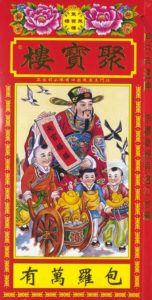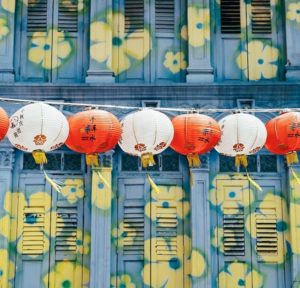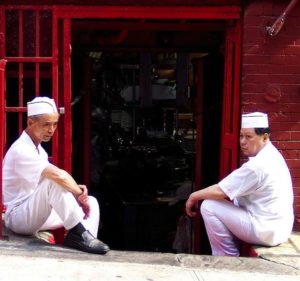Chinese Almanac
by Elaine Chiew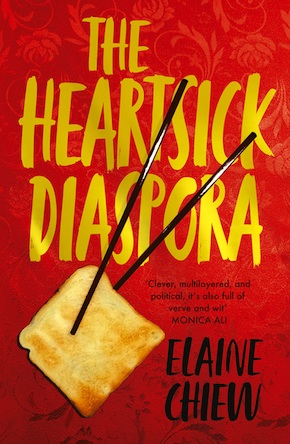
“These are stories to savour like the fine food they describe. Sharply observed, funny, sad and entertaining.” Paul McVeigh
My father lives by the Chinese Almanac (通勝) – it tells fortunes. Like when might be a good day to marry your lover or move house or landscape a garden.
Me, I have no truck with that kind of hocus-pocus. Keep it simple. Two rules: you don’t turn down food; you stay the fuck out of your parents’ love life. Born in the year of the horse, I’m pretty good at running.
My sister, Tina, calls to say that Mom’s best friend, Mrs Poon, has died. She died last week. ‘One minute she was crunching salted peanuts, next thing, her face fell smack on the mahjong table between the Five Bamboos and the South Wind. Mom wept that Mrs Poon didn’t pay attention to the signs from the Almanac. She had hot ears and twitching eyelids the entire day she died. You know what they call that? Tragedy about to strike.’
I mumble, ‘I thought it meant someone was cursing you behind your back.’
Tina ignores me. Reminds me to pick up the turkey from Delmonico’s.
The news comes as a shock. Mrs Poon, if I’m guessing correctly, was all of fifty-six, only two years older than Mom. She, her husband, Gerald, and two other Chinese couples formed the set our parents hung out with in Morristown, New Jersey – hitting the jai alai on Saturdays and mahjong on Sundays. Uncle Gerald was the first to ‘pop off’, as Tina describes it, setting off a tsunami of chain reactions, like a fifty-episode Chinese historical drama. They’d all immigrated from the Mainland at one point or another, except for Mrs Poon, who was Singaporean Chinese just like Mom. Was also the reason Mrs Poon and Mom were tight buddies, since their Chinese quotient or pedigree was more questionable than the others.
‘PS,’ Tina says, ‘Dad’s been having hot ears every night. Consulting his Almanac and keening. Last night, Mom chased him around the house wielding her vibrator yelling why they no longer have sex.’
Though I’m even less tuned in to my Chinese roots than Tina, who makes Mom look good in this respect, I know she’s making this shit up. The Almanac may be useful to consult regarding where to place the bagua or water feature to stimulate mountains of wealth, or inauspicious days to dig a grave or fell trees, but is dead silent about when to have relations with a bereaved wife.
Mom has got her hair up with a scrunchie, and she’s pasted on false lashes that look like furry caterpillars. Her leotard is fuchsia pink; her thighs look like hot-water bottles.”
You know this year’s turkey is going to be a boondoggle when you arrive at your home doorstep and find your mother dressed in Lycra and flirting with the UPS delivery guy. The clip on his lapel says: Hernan. Mom has got her hair up with a scrunchie, and she’s pasted on false lashes that look like furry caterpillars. Her leotard is fuchsia pink; her thighs look like hot-water bottles.
Hernan claps me on the back. ‘Hermano. This the intern doctor from the city? Looks like you should doctor yourself, eh?’ He gives my thick-cut midriff a mock punch. ‘Too many kung pao chickens right here,’ he sniggers.
I give Hernan my best jaundiced eye. To Mom, I say, ‘I found you a ten-pounder, like you requested.’ I swing the trussed-up turkey in the Delmonico bag, barely missing Hernan. Tina appears, looking like a twin upgraded 2.0 version of Mom, but in pigtails.
‘Dad’s in the garden shed, hiding,’ she whispers.
Mom snaps her heels around, lets the screen door shut with a bang.
Dad is hunkered in the gloom next to the pitchfork still clumped with soil, cleaning his garden shears.
‘爸, you ok?’ I ask.
He speaks in Mandarin. ‘Your mother offers the UPS bad dude Red Bull and chocolate chip cookies. The guy has a [crawdad] tattoo on his arm.’
I hope I’ve understood him correctly. ‘UPS’ and ‘Red Bull’ were in English; crawdad because I saw it on Hernan’s arm. This is how we’ve always communicated – in two languages that don’t have a common root, and I fill in between the brackets with my imagination for words I don’t understand. We’re like SpongeBob and Patrick, except I’m the version of SpongeBob who’s more honest about the fact that Patrick is usually clueless as well as brainless, and I humour him. Tina likes to say, ‘I’ve seen you both talk. You talk plenty. You argue just fine.’
‘You’ve pulled up all the weeds but left the roots, Dad.’
‘Sex, sex, sex! That woman’s like a horny rabbit.’ 兔子, the Chinese words for rabbit, I actually understand. A hapless uncle – or was it Uncle Gerald? – had once told me it was also slang for being gay.
I help Dad bag the mulch and weed cuttings in black trash bags. Cleaning up is what I do best with him. And it’s not that we don’t talk, but that we don’t ever say anything important. ‘You should talk to her, maybe?’
Dad blows one nostril with a fingertip, leaving a dark smudge, so now he looks like a sad clown. ‘You can’t trust a woman who [beats her eggs with a rotary egg beater]. What’s wrong with [a good old-fashioned fork]?’ He flicks his fingers. Soil flies everywhere. ‘Did you know, before your Uncle Gerald died, he asked me to find a way for him to [have virtual sex with a transsexual]?’
‘Well, good for him.’
Dad frowns. ‘Married for twenty-seven golden years, and he wants to have [virtual sex with a transsexual].’
‘He should be so lucky.’
‘What’s the matter with you? I’m telling you,’ Dad raises his voice, ‘PEOPLE AREN’T WHAT THEY SEEM. You spend your whole life with someone – YOUR WHOLE LIFE – and lo, she wakes up one day and it’s not the same person you went to bed with the night before.’ He suddenly switches to English. ‘Tell me, Pooch, why that happen?’
‘Dad, don’t call me Pooch.’
Dad’s shoulders sag. He says, ‘叶公好龙.’
‘I don’t know what that means.’ I’ve never seen him so full of non-sequiturs before.
‘Lord Ye, you know? He say he love dragon, but really he fear dragon.’
I don’t know that Dad really cares what Tatsuro thinks of us; ‘face’, here, is a shaming device to regain control of a situation, and a totally inadequate one at that.”
So, the turkey’s been stuffed with pork egg foo young, and Tina has invited a Japanese student from her church. When we sit down to dinner, Dad’s the only person missing. I volunteer to get him from the shed.
Mom picks up her chopsticks, the only person I know who eats Thanksgiving turkey with two sticks. ‘Tatsuro?’ she lowers her voice when she addresses Tina’s friend. ‘You look like a dark meat kinda guy.’ Tina turns the radio on.
Dad walks in the door with Mom’s cocker spaniel, Popeye, who looks as though he’s flung himself into a hedge, peppered as he is with grass cuttings. ‘The neighbours are talking about you and that UPS bad dude with the [manboobs], Eileen.’
The grandfather clock ticks in the hallway. Popeye barks at the word UPS.
Mom clicks her chopsticks. ‘You don’t want to end up like Gerald, having weird libido and dying at sixty.’
Tina rolls her eyes.
Dad rubs his pate, frustrated, answering Mom in Mandarin, ‘What are you doing, Eileen? That’s not for common consumption. Stop [throwing tantrums] like a big baby. What will Tina’s friend think?’
撒娇. Now, those are actually two characters I know. Dad used it often enough when I was growing up, when he wanted to say, ‘man up’. When I looked up sā jiāo, the online dictionary said: To act in a coquettish manner. Or to act like a brat. Both translations seem to apply equally in this instance. And I don’t know that Dad really cares what Tatsuro thinks of us; ‘face’, here, is a shaming device to regain control of a situation, and a totally inadequate one at that.
‘When you die, it’s finito,’ Mom declares to Tatsuro. ‘Death waits for no one. Or rather, it waits and pounces on you. I’m no sitting duck.’
Tatsuro spears a piece of turkey gingerly, puts it in his mouth and chews.
Then it all goes pear-shaped. Dad refuses to eat the egg foo young, and Mom refuses to serve him any turkey. Dad slaps his hands on the table, up-ending the platter of egg foo young, which slips off the table and crashes on the floor. He yells, ‘莫名其妙’ (ridiculous) and exits stage left.
Tina starts quoting Matthew 8:14, ‘When Jesus came into Peter’s house, he saw Peter’s mother lying in bed with a fever.’ But who is Jesus here? Who is Peter? Who, in fact, is being betrayed?
Tatsuro eyeballs all of us. Popeye starts lapping up the goo on the floor. Mom begins to cry. We hear about The Tibetan Book of the Dead on her side-table. We hear about Hernan’s ‘nice manners’. ‘Offers are still coming my way, you know?’ Mom sobs. She wants us on her side. ‘Did you know Mrs Poon died all sexed-up? Is that any way to go?’
From the door to the back yard, we hear Dad: ‘So get dildo, may God will save the queen.’ In English!
When I was little, Dad tried to tutor me in Mandarin. At least learn some character. He meant the letters, of course, but the Chinese often mix up their singular and plural. There’s a beauty to character, can you see? He would try to teach me Chinese calligraphy – that bastion of high-class Chinese breeding, see how the word for fire (火) in Mandarin looks like a man running and waving his arms, and water (水) looks like a flowing stream? To me, they looked exactly the same, and I used to mix them up, until Dad would run his fingers through his hair till it stood on end, exasperated but trying not to yell, holding it all in. That was what I understood Chinese character building was: holding things in, damming them up. Until one day, you literally have a meltdown. In psychology, having a meltdown is an emotional eruption, when you can no longer control or hide overwhelming unpleasant feelings. It’s cathartic. Therapeutic. There is no equivalent in Chinese – a nuclear reactor can have a meltdown, the financial markets can have a meltdown, but a person collapses, tumbles down, completely falls apart (崩溃). This is not good for a Chinese person.
Theirs is the kind of marriage built of sacrifice and mutual façades. It’s all about appearances. What I know of the details of their history and courtship is skimpy. With the help of some relatives in Singapore, Dad had actually escaped (good at running away even then) during the Cultural Revolution, and was working at a Chinese printing press in Singapore. A mutual friend introduced my father to my mother in the late ’70s at a swimming club party. Mom said she thought Dad looked like a skeleton in swim trunks, while Dad thought Mom looked as glamorous – in her one-piece, with her hair tied up in a bandana – as a Shanghai movie star. Or Sophia Loren. How those two categorical entities are conflated in Dad’s mind is baffling. After marriage, they soon learned they didn’t have much in common: she liked the urban night life of Geylang and Bugis, buzzing as it was then with transvestites and transsexuals, while he preferred his Chinese arts – painting huāniaˇo (birds and flowers), calligraphy, sculpting bonsai, and meditating in temples and botanical gardens. They immigrated to America shortly afterwards. The Golden Mountain offered a better life. Tina was born in Morristown, sliding out like the force of nature – a veritable squall – she would be.
Likewise, I keep my sex life secret from my parents – this frequenting of gay bars in the Lower West Side and chasing Gatsbys everywhere – to save them ‘face’. There’s an exchange rate: the act of telling them is to reveal my inner shame, which bizarrely gets plastered on them, thence environmentally eroding the face they wear as ballast against the world. There’s a hierarchy of sins: being gay is not as heinous as being unfilial. I can do whatever I want, so long as the world they inhabit has no idea who I am or what I do. It would 崩溃 their façade.
Dad tries to bury his sadness in garden implements. When he cries, he cries along with the snip of secateurs. He says he misses Mrs Poon’s black sesame cookies. Tina asks Tatsuro if he would like to visit again. He gives an emphatic nod. We’re as exciting as the circus to him. A not-banal Asian American family, come again? I go back to New York City with twitchy eyelids and a headache.
For a whole week, we eat at Fock Sem every night. Dad greets my suggestion of Western food with mournful eyes.”
Two weeks later, Dad arrives at my apartment in Midtown Manhattan. He brings a small suitcase. ‘I’m coming to stay for a while, Pooch. I can sleep on the couch.’
But of course, he doesn’t sleep on the couch.
The two of us have Chinese at Fock Sem the first night, and Dad asks for extra fortune cookies, dissatisfied with each one he cracks open.
‘Dad, I thought you’re a Chinese Almanac kinda guy.’
He looks me dead in the eye. Says in Mandarin, ‘It’s good for some things, not so good for other things.’ No kidding. He reads off another fortune: ‘You don’t have a claim to any place in this world, but each has a claim on you. Story of my life,’ Dad huffs. He stares at me stealing the zodiac paper placemats from Fock Sem and zipping them up in my windbreaker. ‘The dog is loyal and trustworthy, but not too smart.’
‘I’m a horse, Dad. What fortune did the cookie give you?’
He shows me another one. Meh, the cookie says. The back of it is the character 没 – to not have/be, although perhaps I’ve gotten it wrong.
‘What’s this say?’
Dad looks at me. ‘You don’t know? I must have taught you this same character a million times.’
‘Don’t start.’
‘I don’t understand why your Chinese is so horrible. We even had Gerald come tutor you in Chinese when you were little.’
The Chinese believe that all humans have a male and female side – yin and yang. This must be what facing your mortality does to you: your dad becomes yin and a nag, while your mom grows a pair and gets frisky.
For a whole week, we eat at Fock Sem every night. Dad greets my suggestion of Western food with mournful eyes. While I’m on call or doing rounds at the hospital, Dad wanders around New York City by himself. I have no idea how he fills the time. A degree in Mathematics, and he ended up working in a Chinese supermarket after immigrating here; there was never any need to venture beyond the confines of the familiar, or learn English properly. I worry about him out and about, whether a policeman on a horse will arrest him, whether he’ll get mugged or pickpocketed, whether he’s lonely or sitting on a park bench somewhere throwing bread crumbs at pigeons.
I come back to my apartment and find him doing the washing, stomping on his wet clothes in the bathtub the way I Love Lucy stomped grapes to make wine. He hangs them from the radiator, where they drip, transforming the bathroom tiles into a hazard of soapy puddles.
‘Dad, there are laundry machines in the basement.’
‘I tried,’ he says, dejectedly. ‘I couldn’t figure it out, Pooch.’
‘Don’t call me Pooch.’ I’m left with trying to figure out whether Dad just can’t make out the instructions because they’re in English or because he’s never had to do his own laundry before. I have a party invitation coming up this weekend; it’s not the kind of party my father should see me going to. I could get dressed at Matt’s, but then I would have to explain why I’ve never mentioned him to my parents. Either way, thinking about it, getting dressed at home or getting dressed at Matt’s, there’s uncomfortable explaining to do.
Dad asks if I would like to have Korean instead of Chinese. His tone seems to suggest he’s crazy to even think about it. ‘The ladies at Seoul and Cozy in Korea Town are something. They gave me all this free food in little dishes. Free dim sum!’ Too much stimulation has him as excited as a bumblebee.
I can’t sleep. I watch my father watch TV in the dark without sound. I want to talk to him in our cross-intentioned languages, but I don’t know how. How do I say, ‘It’s time for you go home’ in Chinese without sounding like I’m throwing my old dad out of my apartment, like I’m that second rung on the hierarchy of sin, right beneath being traitorous to one’s country – unfilial?
Tina calls. ‘Dad having a good time at yours? Livin’ la vida loca?’
‘He’s conquering brave new worlds.’ From the corner of my eye, I can see Dad’s back straighten, his face turning slightly towards me, listening.
Tina snorts. ‘Mom says to tell you she does not want Dad to come home. She’s happy to send over some tinned Milo and condensed milk and his Chinese horsehair brushes.’ From the way she’s slurring her words, I know she is massaging her face with a roller.
‘Tina, you have to talk to Mom for me. Dad’s a mess. He needs to be surrounded by his orchids and Venus flytraps.’
She snorts again. ‘Talk to her yourself. Why am I the go-between?’
So much for Christian charity. Dad’s shoulders slump.
My apartment superintendent claps me on the back and tells me my dad gives the best romantic relationship advice. ‘He’s better than Dear Abby!’ That’s my dad: all preach, no practice.”
Dad tells me the shoe-shine guy at Grand Central Terminal and him both play Chinese chess. They’re like best buds now.
Sigh.
The neighbours knock on my door to ask if ‘kind Dennis’ wouldn’t mind walking their dogs again.
The hotdog vendor on Seventh and Thirty-fourth is from Chilpancingo, and Dad knows his whole life story. It’s a Marxist enclave and the guy thinks that’s where terrorists are being bred, Dad declares.
He flirts with the Korean ajumma at the drycleaners. She calls him ‘chagiya’ (sweetheart). But he’s so rusty he tells her he likes her ‘bobble chin’. I watch this interaction with a portion of incredulity, a portion of amusement, a portion of ineffable catch-in-my-throat.
My apartment superintendent claps me on the back and tells me my dad gives the best romantic relationship advice.
‘He’s better than Dear Abby!’ That’s my dad: all preach, no practice.
Every day is a new headline.
I cave and call my mother. She listens to me hem and haw. Then she says, ‘Thirty-odd years of being married to each other, and do you know, Pooch, your dad and I have never taken a holiday together? We don’t even go back to Singapore on the same flight. He always has to fly a few days later or on a different airline. Lufthansa! What kind of marriage is that?’
‘Mrs Poon was Dad’s friend, too.’
‘So why am I doing all the grieving?’
She hangs up.
Tina likes to say that not knowing about our parents’ marriage issues is a blessing in disguise. We can maintain our collective façade, play ‘Happy Family’. Who knew that an abnormal sexual appetite would end up shaking things up like this, starting a reckoning of sorts?
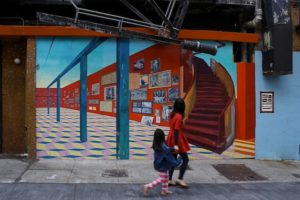
‘If These Walls Could Talk’ by Robert Minervini, Wentworth Place, Chinatown, San Francisco. Stephen Kelly/Wikimedia Commons
Saturday rolls around and Tina does not answer her phone. When she finally does, she’s in Poughkeepsie on a church retreat. She tells me Mom has bought herself a package tour to see the Northern Lights and ride a snowmobile in Lapland. Alone.
‘What? She hates snow.’
It feels like the beginning of the end, except that it’s anticlimactic, because she’s actually abandoned Popeye, stuck him in a dog kennel, which she’s never done before. Popeye will end up biting some other dog and we’ll get slapped with a lawsuit.
When I tell Dad, he looks at me as if I’ve just spoken to him in Bulgarian.
‘Crazy lady, what I tell you?’ Dad wants to know if I feel like watching a movie together. A couple of movies sound interesting – Batman’s playing and afterwards we can go have dobbokki together, he pronounces it ‘dog-bogey’.
‘Are you serious?’
Dad shrugs. ‘Cannot jump on plane and bring her back. 生米煮成熟饭!’
It feels like I ought to be able to sally forth with some Chinese proverb to counter Dad’s, something that would deactivate a bomb – what was that saying about not using a hatchet to remove a fly from the forehead of a loved one?
‘I can’t watch a movie with you. I’ve got plans.’ Even saying this gives me anxiety.
He looks a little miffed. ‘What sort of plans?’
It’s impossible to answer this question.
When I come out of the shower, Dad is on the other side of my closed bedroom door. ‘Listen Pooch, what about after you come back? These places open late.’
I throw open my wardrobe door, trying to think up a reply. It’s then I see them: his row of Oxford shirts hanging neatly in my closet, his tasteless geometric-patterned sweaters, also hung up and drooping at the shoulders. They have this look about them: able-bodied and suggestive. I have a vision of Mom careening down a slope on skis with her scarf sailing behind her, Tina falling over in front of the tabernacle, vociferating in tongues, having a Pentecostal fit. I think about Dad and his Almanac. What does the year hold in store for dogs and horses? Does it say: a good day for encoffining, or residence relocation? Is it an auspicious day to come out to your father while he’s snacking on sunflower seeds and dropping shells all over your suede couch? Would the opposite of straight love be curly or crooked? What is another slang for gay in Mandarin – brokeback shorts?
Big dramas push away small dramas, let that be a Chinese proverb.
Dad stares when I come out of my room. He stares at the eye makeup, the gold lamé shirt with front ruffle detail, the pink trousers, the long turquoise boucle overcoat I pull on. He clears his throat. ‘You look like your Uncle Gerald, Pooch.’
‘Gerald is not my uncle. And stop calling me Pooch.’
Dad stuffs his hands into the pockets of his gym pants. ‘I remember once you came out wearing one of Tina’s dresses during your Mom’s Amway party. It didn’t look good, I lied.’
This moment is one I’ve imagined umpteen times in my head, and inexplicably, the Mandarin trips out, just when I thought the correct words wouldn’t come, ‘Dad, I have something I need to say to you.’
His gaze darts about. Dad does not look at me. He makes an effort bending down; his nylon trousers make a rustling sound. He picks up his Chinese Almanac, which has fallen to the floor. The sum of his gestures is a nervousness; the filaments of knowledge thread through me, docking in all the places where blockage has occurred.
I won’t need our cross-intentioned language for what I’m about to convey. Something tells me Dad’s known about Gerald all along, that he pities Mrs Poon, and that he knows subconsciously about me, too – those words Dad supplied that I didn’t understand, so scared I blocked them out with my imagination – curly love that is also a [divided peach] (分桃) about to [shorten its sleeve] (断袖).
Still, as I’m about to hoist myself up the hierarchy of sins here and watch my father’s face crumple, a different expression of his slides across my frame of reference: his face composed with long-suffering patience as he watches me hold the calligraphy brush, guiding my hand with just a thumb nudge; his beaming face as he presents me with my first set of stethoscopes upon graduation, telling all and sundry about his doctor-son, even the canvas-wrapped kayak beached on Chelsea Pier (Dad, that’s not a hobo!); his look of determination as we trawled multiple fabric stores in the fashion district looking for cotton sacking for an art project because I insisted my pinto bean baby had to be Chinese, and the closest we got to was ochre. That’s how my father tells me he loves me, without ever using the words.
Never say anything important with words. Chinese fortune cookie.
Always believe a Chinese fortune cookie.
From The Heartsick Diaspora (Myriad Editions, £8.99)
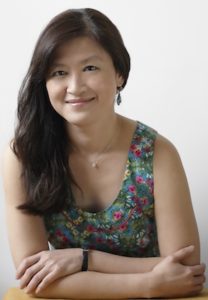 Elaine Chiew is a writer and a visual arts researcher, and editor of Cooked Up: Food Fiction From Around the World (New Internationalist, 2015). Twice winner of the Bridport Short Story Competition, she has published numerous stories in anthologies in the UK, US and Singapore. Originally from Malaysia, she graduated from Stanford Law School and worked as a corporate securities lawyer in New York and Hong Kong before studying for an MA in Asian Art History at Lasalle College of the Arts Singapore, a degree conferred by Goldsmiths, University of London. She lives in Singapore. Her debut story collection The Heartsick Diaspora is published in paperback by Myriad Editions.
Elaine Chiew is a writer and a visual arts researcher, and editor of Cooked Up: Food Fiction From Around the World (New Internationalist, 2015). Twice winner of the Bridport Short Story Competition, she has published numerous stories in anthologies in the UK, US and Singapore. Originally from Malaysia, she graduated from Stanford Law School and worked as a corporate securities lawyer in New York and Hong Kong before studying for an MA in Asian Art History at Lasalle College of the Arts Singapore, a degree conferred by Goldsmiths, University of London. She lives in Singapore. Her debut story collection The Heartsick Diaspora is published in paperback by Myriad Editions.
Read more
invisibleflaneuse.blogspot.com
@ChiewElaine

